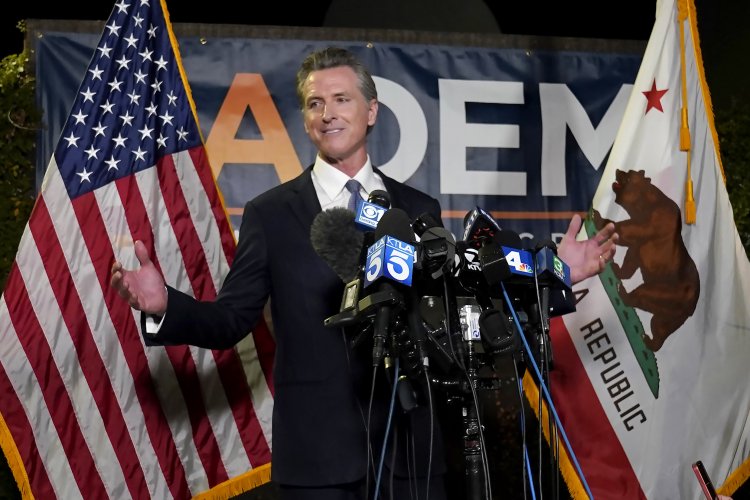Poll indicates fatigue among California voters regarding resistance to Trump
The article explores how voters, in general, have adopted a distinct stance on various topics, including Trump and pressing issues, with a notable inclination among Democrats to pursue a more confrontational strategy.

A surprising plurality of voters express skepticism regarding legal immigration, with less than half believing that California should have the power to enforce its own stringent vehicle emissions standards—an authority the state has upheld for over fifty years.
These results indicate a disconnection between policymakers and voters in a predominantly blue state where Trump gained significant support in 2024, particularly in light of rising concerns over crime and the high cost of living. However, registered Democrats, who represent nearly half of the electorate, display greater enthusiasm for progressive policies and a stronger desire to confront Trump's Washington.
California’s stance toward the president has become a focal point of discussion among elected Democrats as the national party seeks direction. Newsom has invited conservative figures like Charlie Kirk and Steve Bannon onto his podcast, requested wildfire aid from the president for Los Angeles, and allocated millions to legally oppose Trump's attempts to undermine state interests—all while Democratic lawmakers grapple with the dual challenges of addressing quality-of-life issues and opposing Trump.
Recently, the governor and attorney general announced California would sue Trump over tariffs, becoming the first state to take such action.
Following Trump’s 2016 election, elected Democrats in California initially rallied against him with fervor. However, they have largely adopted a more restrained approach after his recent electoral success, reflecting a broader period of introspection within Sacramento. Jack Citrin, a political science professor at UC Berkeley and director of the poll conducted with PMG, emphasized that the findings reveal the predominance of self-identified progressives within California’s political class.
“The influentials are a much more homogenous group than the registered voter public,” Citrin noted. “The major difference is the electorate has polarized.”
While Democratic voters favor taking on Trump, a significant portion of the electorate desires a less confrontational stance from their representatives. About 43 percent of registered voters feel that leaders are “too confrontational,” a view primarily held by Republicans and independents, whereas one-third perceive them as “too passive.” Among Democrats surveyed, 47 percent advocated for a more assertive approach.
In contrast, nearly half of influencers regarded their leaders as too passive.
For years, California’s Democratic officials have aimed to counter Trumpism by reinforcing the state’s liberal policies. They have enacted laws to extend health coverage to undocumented immigrants and limit federal immigration enforcement, along with ambitious climate objectives that oppose the Trump administration's agenda.
While voters do not reject these policies—support for vehicle emissions waivers increases when framed as a challenge to Trump—they are less inclined than policymakers to fully embrace California’s progressive agenda.
Studies consistently show a preference among Californians for a state that reflects ethnic diversity, according to Matt Barreto, a political science professor at UCLA. He noted that the stronger support for pro-immigrant policies among influencers indicates a more sophisticated understanding of these issues.
“I have not seen anything that suggests Californians are moving towards being anti-immigrant,” Barreto stated. “The policy folks are more plugged in, and they’re more aware of the factual landscape.”
While a significant 60 percent of voters support the state’s “sanctuary” laws, which separate local law enforcement from federal immigration authorities, policy influencers expressed 20 points more support for that initiative.
Voters tend to support reducing legal immigration and promoting assimilation, whereas policy professionals favor an increase in legal immigration and the preservation of distinct cultural identities.
The survey, conducted on the TrueDot.ai platform from April 1 to 14 among 1,025 California registered voters and 718 influencers, involved a targeted outreach to individuals working in various professional capacities within the state. The registered voter sample was generated by Verasight from California’s voter file, with a modeled error margin of plus or minus five percentage points.
One significant environmental policy in California—the state's authority to impose strict auto emission standards—received only 45 percent majority support among voters, compared to a resounding 82 percent approval from policy professionals. Voters expressed greater support for these emissions standards when framed as California taking a stand against Trump, with a 53-point majority indicating support even if it meant Trump would withhold wildfire aid. More than three-quarters of voters maintained support even if it risked leading other states away from following California’s example; in contrast, influencers showed less inclination to endorse the measure under the same scenario.
Craig Segall, an environmental policy consultant and former California Air Resources Board employee, commented that the ambiguity regarding one of California's foundational environmental policies suggests that many voters don’t perceive tangible benefits from the state’s climate regulations.
“I doubt there’s a lot of hometown California pride in waiver authority,” Segall said.
Sanya Singh for TROIB News












